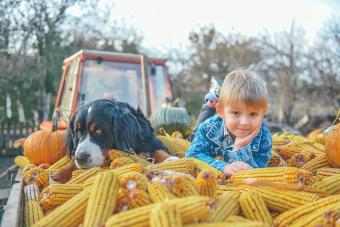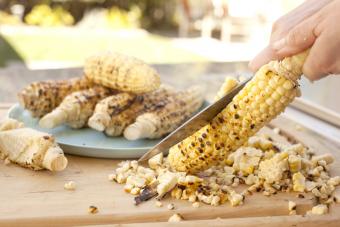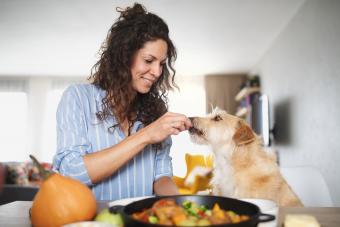
Whether you're evaluating the nutritional contents of dog food, or you'd like to feed your pup a few kernels while cooking, you've likely wondered if dogs can eat corn. Yes, corn kernels are safe for dogs. However, certain parts of this vegetable can be dangerous for your pup. Consider the health benefits and potential risks before giving your dog corn.

Corn Is Safe for Your Dog
Corn has gotten a bad rap within the pet food space as being a "filler food," but that's not the case. This vegetable offers dogs many health benefits, including fiber, protein, vitamins C, B, and E, lutein, potassium, and magnesium. Although corn is quite starchy, carbs are not bad for dogs. As omnivores, they need carbohydrates as part of a well-balanced diet.
Corn is considered a whole grain, which makes it more nutritious than refined grains like white rice or white flour products. If you're concerned about corn being an ingredient in your dog's diet, rest assured that it does provide nutritional value. It's also safe to give your dog cooked corn kernels as an occasional snack.
How Much Corn Can Your Dog Have?
Always consult with your veterinarian before offering your dog a new food. Corn may not be ideal for pets with certain conditions like diabetes. However, if you elect to give your dog corn kernels, do so only in moderation. Given that corn is high in carbs and sugar (particularly sweet corn varieties), it shouldn't be given in excess. Too much could lead to weight gain or diabetes.
Treats should make up less than 10 percent of a dog's daily caloric intake. That means a 50-pound dog can have around ½ cup of corn, while a 20-pound dog could have about 3 tablespoons. Keep in mind, these approximations are under the assumption that your dog doesn't eat any other treats or table scraps for the day!
Corn can also be incorporated into homemade canine diets as a source of healthy carbohydrates. When making dog food at home, use a dog-specific recipe so your dog gets all required nutrients and minerals.
How to Prepare Corn for Your Dog
When preparing corn for your dog, use these guidelines for a safe snack.

- Cook corn before feeding it to your dog. Raw corn can be hard on their digestive system.
- Do not use any butter or oil, as these fatty ingredients can upset your dog's stomach or even lead to inflammation of their pancreas. Steaming or boiling is often the best form of cooking, as it limits these extras.
- Skip salt, spices, or seasonings, particularly onion or garlic, as these are toxic to dogs.
- Cut the kernels off the cob before serving. Kernels are already very small, making them the perfect size to prevent choking.
- Dispose of the cob in an outside trash or receptacle where your dog cannot retrieve it.
If you'd like to offer your dog a bite of a corn dish intended for humans, consider how it was cooked. Avoid giving them anything prepared with oil, butter, cream, spices, garlic, onion, or any other ingredients that could be toxic or irritate their stomach. In any case, never give your dog the cob of the corn.
Dangers of Corn Cobs
Although they might seem like a nice snack, corn cobs are not safe for dogs. Not only can the cob serve as a choking hazard, but it's far too easy for your pup to swallow this tasty treat while or after chewing. And if they do, they're at risk for severe complications.
Corn cobs are very dense and cannot be digested by a dog's stomach; therefore, they commonly create a blockage while attempting to move through the digestive tract. Gastrointestinal obstructions require surgical removal of the foreign material. These cases are considered medical emergencies and are life-threatening if left untreated.

What to Do If Your Dog Eats a Corn Cob
If you see your dog chewing on a corn cob, immediately remove it. However, should you discover that they ingested the cob, contact or present to your veterinary hospital right away. Waiting in the hopes that the cob will pass is not wise. If caught early enough, it's possible that your veterinarian can avoid surgery. The sooner treatment is implemented, the better the prognosis for your pet.
Symptoms to Monitor for
Some dogs may show symptoms right away, whereas others may not become clinical until a few days following cob ingestion. The most common symptoms of a gastrointestinal obstruction include the following.
- Inappetence or decreased appetite
- Nausea (lip-smacking or excessive drooling)
- Vomiting or regurgitation
- Lethargy, listlessness
- Constipation or straining to defecate
- Abdominal discomfort (hunched appearance or growling/snapping when belly is touched)
Alternatives to Corn for Dogs
Many vegetables are safe for dogs to eat. Instead of corn, you could opt for a food lower in starch like cucumber, green beans, or spinach. Each dog has their own tastes and preferences, so try out any of the numerous dog-friendly foods to find what your pup likes best.
If your dog is a chewer, never toss them a corn cob. Offer them a safe chew toy instead. Larger toys are typically better, as they don't serve as a choking risk and cannot be swallowed.
Can Dogs Eat Corn?
If your dog swipes a few corn kernels off the kitchen floor, there's no need to worry. Corn is safe for dogs in moderation. It has nutritional value but should be limited given its high carbohydrate content. The cob, however, should never be given to dogs. Ingestion of a corn cob can cause significant problems or even be fatal.







